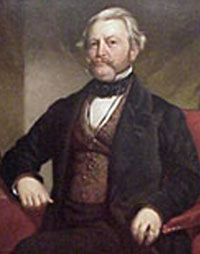
Townsend Harris (1804-1878)
Townsend Harris, the first American diplomat to the Empire of Japan, was born October 3, 1804, in the town of Sandy Hill, now Hudson Falls, New York. His father, Jonathan Harris was the village magistrate as well as a hatter who owned peach orchards. His mother was Eleanor Watson. Townsend had four brothers and one sister, and he was named for his grandmother, Thankful Townsend.
Townsend was an eager young scholar and he was rather disappointed when he finished junior high school to find out that his family could not afford to send him to a preparatory school, much less college. Instead, when he was 13 years old he traveled to New York to join his older brother, John, in his porcelain import business. Townsend excelled in his duties keeping the records of this business, so John invited Townsend to become the junior partner of the firm at 16 years of age.
Townsend became interested in the civic affairs of his adopted community. First he became a member of one of the volunteer fire companies that preceded the establishment of the New York City Fire Department. Later he became active in Democratic Party affairs in New York and became the President of the New York City Board of Education in 1846.
In this position, Townsend lobbied the New York State legislature to authorize the expenditure of the Literature Fund to support a public institution of higher learning in New York. He expressed his views in a series of columns written under the pen name of "Plain Truth" that appeared in The Morning Courier and New York Enquirer. In the column that appeared in the New York Enquirer on March 15, 1847, he stated the following:
No, Sirs, the system now pursued by that excellent society and by our ward schools is the true one, and may be advantageously applied to higher seminaries of learning. Make them the property of the people - open the doors to all - let the children of the rich and the poor take their seats together and know of no distinction save that of industry, good conduct, and intellect. A large number of the children of the rich now attend our public schools, and the ratio is rapidly increasing.
The bill passed both houses of the New York State legislature authorizing the expenditure and was approved on May 7, 1847, a date subsequently celebrated at City College as Charter Day. The voters of New York considered the referendum in the Judicial and School Elections held on June 7, 1847, and passed it. The Board of Alderman convened by Board of Education met on June 16, 1847, to formalize the creation of the Free Academy, the original name of The City College of New York. The architect James Renwick (1818-1895) was hired to build the building to house this new academy on a lot at the corner of Lexington Avenue and 23rd Street. The entrance examination was administered to the first group of young men who entered the institution in January 1849, and Townsend Harris attended the opening ceremony.
Three years later, Townsend and his brother John dissolved their business partnership. Townsend continued in the porcelain import business and sailed to the far East to buy items to sell in New York. He considered pursuing a career in the diplomatic service. While traveling in China on a buying mission, Townsend received the news of Commodore Matthew's Perry's (1794-1858) 1853 expedition to Japan and of the treaty allowing for the exchange of diplomatic representatives.
Townsend Harris returned to the United States and sought a diplomatic post in the East where he had extensive trade experience. He was dubbed the American Consul at Ningpo, China, but he subsequently obtained the more prestigious appointment of Consul General to the Empire of Japan, as confirmed by President Franklin Pierce (1804-1869) in July 1856.
Townsend arrived in the costal village of Shimoda, Japan, in August of 1856 accompanied by his secretary and interpreter Henry Heusken (1832-1861). His first diplomatic achievement in this previously closed nation was the Convention of Shimoda, approved in June 1857, establishing the right of American vessels to re-provision at the ports of Nagasaki, Shimoda, or Hakodate, Japan using barter or currency. His diplomatic triumph began when he entered Edo (now Tokyo) in November 1857 after receiving an invitation from the court of the 13th Tokugawa Shogun, Tokugawa Iesada (1824-1858), to negotiate a treaty of trade and amity between the United States and Japan that was signed in July 1858, and subsequently ratified by the United States Senate in December 1858. Townsend Harris is credited as the diplomat who first opened the Japanese Empire to foreign trade and culture.
Owing to his goodwill, openness and honesty, Townsend Harris quickly gained the respect and affection of the Japanese people, and is still revered in Japan. In 1859 his rank was raised to that of Minister Resident. He retired from his diplomatic posts in 1862 and returned to New York, where he spent his remaining years.
Townsend Harris died on February 25, 1878, and is buried in Green-Wood Cemetery in Brooklyn. In 1986 City College accepted a gift from the Japanese people of a refurbished gravesite, which includes paving stones, a stone lantern, a cherry tree, a dogwood tree, and two commemorative stones.
Sydney C. Van Nort, Archivist, City College of New York (April 1, 2004).